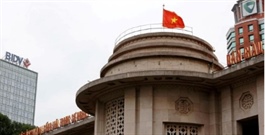Vietnam central bank determined to dampen gold price appreciation
Vietnam central bank determined to dampen gold price appreciation
The State Bank of Vietnam (SBV) will not let domestic gold prices jump much higher above the world gold price, deputy governor Dao Minh Tu told a press briefing on Wednesday.

This photo captures people buying and selling gold jewelry at a store in Ba Chieu Market, Binh Thanh District, Ho Chi Minh City, December 29, 2023. Photo: Tu Trung / Tuoi Tre |
Tu emphasized that the significant disparity in gold prices between Vietnam and the global market is deemed unacceptable.
It is now imperative to revise Decree 24, which has been in effect for over a decade, and empower the SBV to intervene in the local gold market to ensure its stability.
The projected amending and supplementing decree is anticipated to help better manage the gold market and tighten control over a surge in the price of the precious metal in Vietnam.
The government respects residents' rights of storing and trading gold, but it disapproves of the gap in gold prices between the country and the world reaching nearly VND20 million (US$826) per tael.
A tael equals 1.2 troy ounces.
Tu also underlined that the central bank takes a dim view of the wide gap in gold prices between Saigon Jewelry Company (SJC), the largest gold firm in Vietnam, and other gold suppliers.
The central bank will not shield the prices of SJC-branded gold bullion, Tu said.
Dao Xuan Tuan, head of the SBV foreign exchange management department, said that the local prices of the yellow metal, mainly SJC gold, have skyrocketed over the past few months.
In late 2023, Vietnamese Prime Minister Pham Minh Chinh instructed the central bank to address the escalating local gold prices, which he noted had adversely affected monetary markets and market sentiment in the preceding weeks.
The price of gold in Vietnam jumped sky-high in December, reaching a peak of VND80 million ($3,292.86) per tael on December 26, and gained nearly 20 percent since the beginning of 2023, Reuters reported.
The central bank said on Tuesday that it would set a credit growth cap of 15 percent for the local banking system for this year.
The cap can be adjusted depending on the situation as it develops, according to the SBV.
During a press conference outlining the banking system's plans for 2024, Tu remarked that a significant change in the central bank's credit management mechanism was the allocation of one-off credit growth quotas for commercial banks at the beginning of the year, deviating from the recurring allocation system used in previous years.
The change is aimed at injecting more capital into the economy and asking commercial banks to be more responsible for it.
As calculated, an additional VND2,000 trillion ($81.7 billion) will be channeled into the economy in 2024.
As of the end of 2023, the total outstanding debt had stood at VND13,600 trillion ($561 billion) with a growth rate of 15 percent.
Credit is still seen as a major source of capital for the economy, according to Tu.
The central bank asked commercial banks to fulfill this credit growth target for this year to provide sufficient loans for enterprises and residents.
Credit growth can be revised up to 16 percent if the economy needs capital and the macro-economic situation is stable, he said.
With regard to lending rates, Tu said that the central bank will continue to keep a close watch on the global and local economies to make the monetary policy flexible in order to stabilize the macroeconomy and rein in inflation.
Lending rates have been cut to the lowest level in 20 years, so many commercial banks said that they could not keep adjusting the interest down.
However, Tu expected the rates to ebb to a lower level as the central bank will not ask for a hike in lending rates this year.
Lower interest is meant to support residents and enterprises amid the ongoing economic slowdown.

























